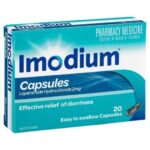What Not to Take With Imodium

Imodium is a brand of loperamide, an antidiarrheal medication. It works by making the muscles in your intestines contract more slowly. This in turn slows the movement of food and fluids through your digestive tract, which allows the bowel to absorb more fluids and nutrients. The process makes your bowel movements smaller, more solid, and less frequent. It also decreases the amount of fluids and electrolytes your body loses.
Imodium is available as a caplet and a liquid. Both forms are taken by mouth. These forms should be used for no more than two days. However, the caplet is also available in a prescription form that may be used long-term. The prescription-strength form is used to treat diarrhea caused by digestive diseases such as inflammatory bowel disease.
How to use Imodium
If you are using the over-the-counter product to self-treat, read all the directions on the product package before taking this medication. If your doctor has prescribed this medication, follow your doctor’s directions and the directions on your prescription label.
Take this medication by mouth, usually after each loose stool or as directed by your doctor. Shake the bottle well before each use. Measure each dose carefully using the attached measuring cup. Do not use a household spoon since you may not get the correct dose.
The dosage is based on your condition and response to treatment. In children, the dosage is also based on age and weight. Adults should not use more than 8 milligrams in 24 hours if self-treating, or 16 milligrams in 24 hours if under a doctor’s direction.
What is a drug interaction?
A drug interaction can be defined as an interaction between a drug and another substance that prevents the drug from performing as expected. This definition applies to interactions of drugs with other drugs (drug-drug interactions), as well as drugs with food (drug-food interactions) and other substances.
Whenever two or more drugs are being taken, there is a chance that there will be an interaction among the drugs. The interaction may increase or decrease the effectiveness of the drugs or the side effects of the drugs. The likelihood of drug interactions increases as the number of drugs being taken increases. Therefore, people who take several drugs are at the greatest risk for interactions. Drug interactions contribute to the cost of healthcare because of the costs of medical care that are required to treat problems caused by changes in effectiveness or side effects. Interactions also can lead to psychological suffering that can be avoided.
What not to take with Imodium
While taking Imodium, you should avoid drinking tonic water because it can interact with the active ingredient (loperamide) and cause serious heart problems.
In addition, certain drugs including prescription, over-the-counter medicines, vitamins, and herbal products can interact with Imodium and prevent it from working properly or increase the risk of certain side effects.
Avoid using or taking Imodium together with any of the following medications and substances:
1. Opioids
One of the most important things to avoid when taking Imodium is opioids. Opioids are a class of drugs that are used to treat pain, but they can also cause constipation. Imodium works by slowing down the movement of the intestines, which can exacerbate constipation caused by opioids. When Imodium is taken with opioids, it can increase the risk of opioid toxicity, which can lead to respiratory depression, coma, and even death.
2. Antibiotics
While Imodium can be effective in treating diarrhea caused by infections, it should not be taken with certain antibiotics. Antibiotics can alter the natural balance of bacteria in the gut, which can lead to diarrhea. Imodium works by slowing down the movement of the intestines, which can exacerbate this type of diarrhea. Antibiotics that should not be taken with Imodium include erythromycin and clarithromycin.
3. Antacids
Antacids are medications that are used to treat heartburn and indigestion. They work by neutralizing stomach acid, which can help to alleviate symptoms. However, antacids can interfere with the absorption of Imodium, which can reduce its effectiveness. If you need to take an antacid, it is best to wait at least two hours after taking Imodium.
4. Antidepressants
Certain types of antidepressants can also interfere with the effectiveness of Imodium. Selective serotonin reuptake inhibitors (SSRIs) and serotonin-norepinephrine reuptake inhibitors (SNRIs) are two types of antidepressants that should not be taken with Imodium. These medications can cause constipation, which can be exacerbated by Imodium.
5. Grapefruit Grapefruit and grapefruit juice should be avoided when taking Imodium.
Grapefruit contains compounds that can interfere with the metabolism of certain medications, including Imodium. This can lead to an increase in the concentration of Imodium in the blood, which can increase the risk of side effects.
6. Alcohol Alcohol should be avoided when taking Imodium. Alcohol can irritate the lining of the stomach and intestines, which can exacerbate diarrhea. Additionally, alcohol can increase the risk of dehydration, which can be a concern when taking Imodium.
7. Other Medications that can cause constipation
Imodium should not be taken with other medications that can cause constipation. Examples of medications that can cause constipation include certain pain medications, antihistamines, and antispasmodics. When these medications are taken with Imodium, it can exacerbate constipation, which can lead to discomfort and other complications.
8. Medications that can cause liver damage
Imodium should be used with caution in individuals who are taking medications that can cause liver damage. Examples of medications that can cause liver damage include acetaminophen, which is found in many over-the-counter pain medications. When taken with Imodium, these medications can increase the risk of liver damage.
9. Medications that can cause drowsiness
Imodium can cause drowsiness in some individuals, particularly when taken in high doses. Medications that can cause drowsiness, such as benzodiazepines, should be used with caution when taking Imodium. When these medications are taken together, it can increase the risk of drowsiness and other side effects.
In conclusion, Imodium is a medication that can be effective in treating diarrhea, but it should be used with caution and not taken with certain medications and substances. Opioids, antibiotics, antacids, antidepressants, grapefruit, alcohol, other medications that can cause constipation, medications that can cause liver damage, and medications that can cause drowsiness are all examples of what not to take with Imodium. It is important to consult with a healthcare provider before taking Imodium or any other medication, particularly if you are taking other medications or have any medical conditions. Following these precautions can help ensure the safe and effective use of Imodium.
It is important to note that loperamide the active ingredient in Imodium can cause serious heart problems. Your risk may be higher if you also use medicines for infections, heart problems, depression, mental illness, cancer, malaria, or HIV. You can also find useful information on Is Expired Imodium Safe to Take?


